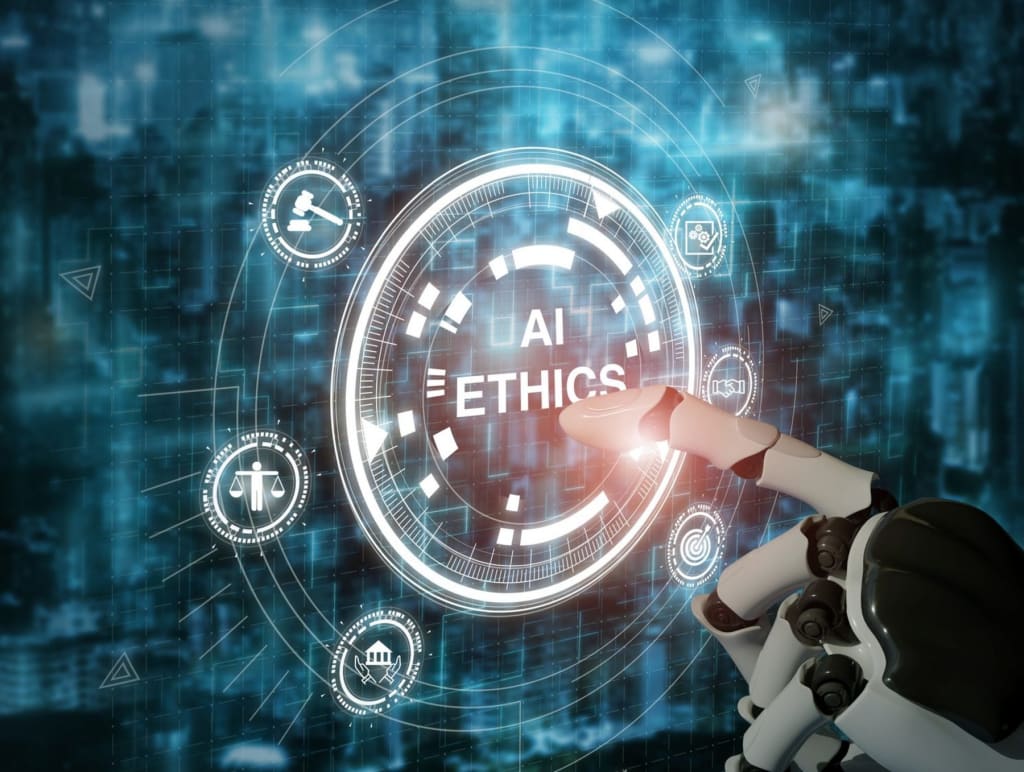The Moral Compass of AI: Navigating Ethical Considerations in the Age of Artificial Intelligence
This blog explains Ethical Considerations in AI

Nowadays, artificial intelligence (AI) is a phenomenon that changes human life due to the introduced innovations in different production fields. But then, every grunt that seems to possess such power would naturally be expected to exercise the corresponding responsibility. When bringing AI into development, it becomes important to deal with ethical problems. AI should be produced and brought to people’s lives in a manner that is just and not partial towards a certain group of people or group of Nations.
The Ethical Landscape of AI: Sometimes one can feel lost between living life to the fullest, being successful, having a career and family, and taking responsibility for own actions or mistakes.
Ethical considerations include Positive AI outcomes that are not intended, for example, an AI-powered hiring system that discriminates against some candidates. Or an AI employed in facial recognition technology that tends to recognize people wrongly after they get programmed with biases infringing on people’s rights to privacy. These are just some of the ethical considerations we must address as AI continues to evolve: These are just some of the ethical considerations we must address as AI continues to evolve:
Bias and Fairness: Through the following cases, it will be understood how AI algorithms can integrate biases that are derived from the training data. It can lead to discrimination and other complications, for instance, employers hiring employees with a certain gender, or loan agencies lending money to certain individuals based on their color.
Transparency and Explainability: Currently, most of the AI models are opaque systems or such ”black boxes,” which make it hard to explain how and why they arrived at a given decision. Chai lack of transparency in such processes could weaken people’s confidence in the institutions they are being implemented for and create doubts about their efficiencies.
Privacy and Security: The main issue that can be associated with the job of AI is that a large amount of data is used to train an artificial mind. Further, the AI systems themselves are not immune from being hacked or being influenced negatively by competitors or any other party leading to breaches in security.
Job Displacement: One inevitable factor that arises with the use of AI is that it has an Effect on Employment and Skills in that it displaces people from their jobs. It was important to focus on the effects of AI augmentation on employment and policy recommendations for intelligent workforce transition.
Navigating the Ethical Maze: Of course, AI course are crucial in today’s world, but they don’t look exactly like the ones shown in Fig.
Ethical growth and implementation of AI are some of the crucial features for a better and fair future. Here's how a best AI course can equip you to be a part of the solution:
Understanding Ethical Frameworks: Identify the current approaches for AI, focusing on the four main pillars: fairness, transparency, and accountability.
Identifying and Mitigating Bias: Discover what different types of bias may appear in using AI technologies, and how to reduce bias in developing and implementing artificial intelligence systems.
Designing Explainable AI: Learn about approaches for creating AI models that are easier to interpret and persuade people towards their Proper Usage.
AI and the Future of Work: Investigate possible consequences of the presence and advancement of A. I, and derive the effective plans for dealing with existing and future employment problems.
By investing in an AI course with a focus on ethics, you can gain the knowledge and skills to:
Protect the transparency of AI by creating non-otherwise specified, fair, and unbiased solutions.
Demand action to ensure that artificial intelligence and machine learning are NOT deployed irresponsibly.
Implant the idea of ethics in the usage of artificial intelligence to the respective stakeholders.
In this article, I introduced the concept of a responsible approach to AI, which can be considered as a roadmap toward a better future with AI technologies.
On the one hand, AI is one of the most promising technologies that can enhance various aspects of our lives; on the other hand, there are definite ethically relevant topics that cannot be ignored. It turns you into a responsible AI citizen – either a developer or end user or merely an interested citizen in a world that is increasingly shaped by artificial intelligence. In this way, we can guarantee that Artificial intelligence is acting as a global positive Agent to promote new and better conditions for human beings without violating any of our principles.
About the Creator
Fizza Jatniwala
Fizza Jatniwala, an MSC-IT postgraduate, serves as a dynamic Digital Marketing Executive at the prestigious Boston Institute of Analytics.
Enjoyed the story? Support the Creator.
Subscribe for free to receive all their stories in your feed. You could also pledge your support or give them a one-off tip, letting them know you appreciate their work.





Comments (1)
Write more like this.